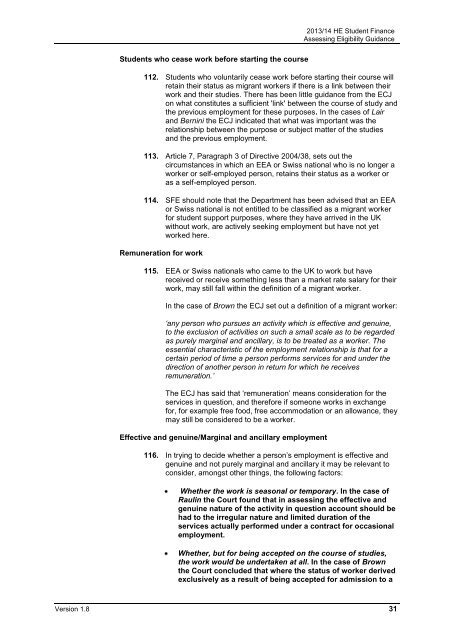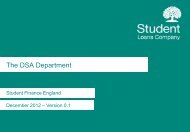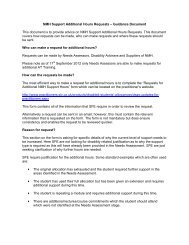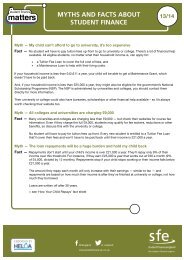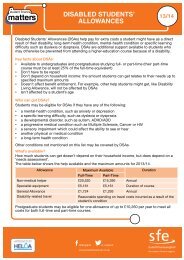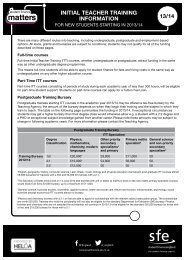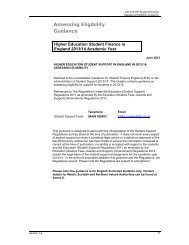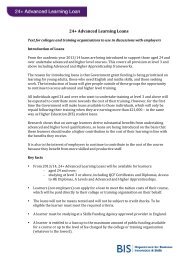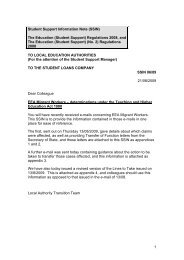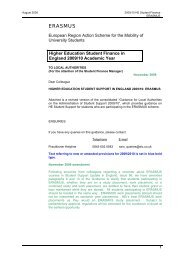SFE Assessing Eligibility Guidance 2013/14 - Practitioners - Student ...
SFE Assessing Eligibility Guidance 2013/14 - Practitioners - Student ...
SFE Assessing Eligibility Guidance 2013/14 - Practitioners - Student ...
Create successful ePaper yourself
Turn your PDF publications into a flip-book with our unique Google optimized e-Paper software.
<strong>2013</strong>/<strong>14</strong> HE <strong>Student</strong> Finance<br />
<strong>Assessing</strong> <strong>Eligibility</strong> <strong>Guidance</strong><br />
<strong>Student</strong>s who cease work before starting the course<br />
112. <strong>Student</strong>s who voluntarily cease work before starting their course will<br />
retain their status as migrant workers if there is a link between their<br />
work and their studies. There has been little guidance from the ECJ<br />
on what constitutes a sufficient 'link' between the course of study and<br />
the previous employment for these purposes. In the cases of Lair<br />
and Bernini the ECJ indicated that what was important was the<br />
relationship between the purpose or subject matter of the studies<br />
and the previous employment.<br />
113. Article 7, Paragraph 3 of Directive 2004/38, sets out the<br />
circumstances in which an EEA or Swiss national who is no longer a<br />
worker or self-employed person, retains their status as a worker or<br />
as a self-employed person.<br />
1<strong>14</strong>. <strong>SFE</strong> should note that the Department has been advised that an EEA<br />
or Swiss national is not entitled to be classified as a migrant worker<br />
for student support purposes, where they have arrived in the UK<br />
without work, are actively seeking employment but have not yet<br />
worked here.<br />
Remuneration for work<br />
115. EEA or Swiss nationals who came to the UK to work but have<br />
received or receive something less than a market rate salary for their<br />
work, may still fall within the definition of a migrant worker.<br />
In the case of Brown the ECJ set out a definition of a migrant worker:<br />
‘any person who pursues an activity which is effective and genuine,<br />
to the exclusion of activities on such a small scale as to be regarded<br />
as purely marginal and ancillary, is to be treated as a worker. The<br />
essential characteristic of the employment relationship is that for a<br />
certain period of time a person performs services for and under the<br />
direction of another person in return for which he receives<br />
remuneration.’<br />
The ECJ has said that „remuneration‟ means consideration for the<br />
services in question, and therefore if someone works in exchange<br />
for, for example free food, free accommodation or an allowance, they<br />
may still be considered to be a worker.<br />
Effective and genuine/Marginal and ancillary employment<br />
116. In trying to decide whether a person‟s employment is effective and<br />
genuine and not purely marginal and ancillary it may be relevant to<br />
consider, amongst other things, the following factors:<br />
Whether the work is seasonal or temporary. In the case of<br />
Raulin the Court found that in assessing the effective and<br />
genuine nature of the activity in question account should be<br />
had to the irregular nature and limited duration of the<br />
services actually performed under a contract for occasional<br />
employment.<br />
Whether, but for being accepted on the course of studies,<br />
the work would be undertaken at all. In the case of Brown<br />
the Court concluded that where the status of worker derived<br />
exclusively as a result of being accepted for admission to a<br />
Version 1.8 31


